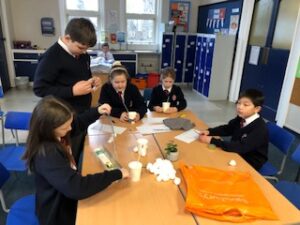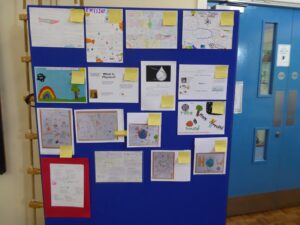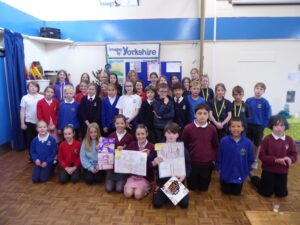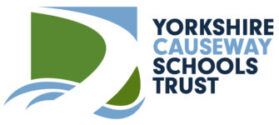Subject Leader
The subject leader for Science is Mrs McNichol.
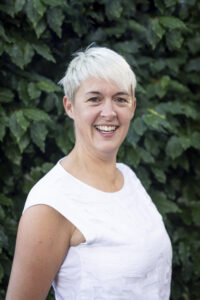
Mrs McNichol
They can be contacted by emailing admin@stpeters.ycway.uk using the subject title FAO of followed by the name of the subject leader. Emails typically receive a reply within 2-3 working days. Please note most of our subject leaders have a full-time teaching commitment.
With oversight and support from our Senior Leadership team subject leaders oversee and monitor the intent, implementation and impact of their subject.
Curriculum Development
Intent – The ambition and principles of our curriculum for our children. The curriculum content we expect children to learn. What we expect children to know.
Implementation – How the intentions are realised. The sequence and strategies used to ensure children know and remember more.
Impact – How we check and see if children know what we expect them to and how we help them further if needed. How knowledge and skills learnt improved and enriches their lives socially, emotionally, spiritually as well as academically.
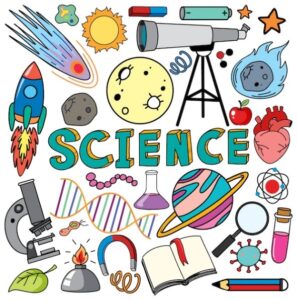
Subject Rationale
St Peter’s instil a curiosity for the wonder of the natural world in our children, as well as increase their care and appreciation of it. This is demonstrated through practical, cross-curricular teaching and learning of the National Curriculum for Science. By the time children reach the end of Year Six they will have developed a secure Scientific understanding and will be working in line with age related national expectations.
At St Peter’s, we embed the key questioning and investigative skills through hands-on experiences that encourage children to apply their knowledge to real and modern life. Children will continue to build on their prior learning from being the youngest in school, to the oldest through formative assessments such as quizzes, activities, and recall assessments to ensure the learning is embedded in their long-term memory to ensure their learning journey does not stop with us as they continue to KS3.
The children’s learning journey within science begins in the Early Years (EY). Our youngest children learn about science through the EYFS areas of learning in the Development Matters. The most relevant statements for science are taken from the following areas of learning: Communication and Language, Personal, Social and Emotional Development and Understanding the World.
Related Development Matters Learning
Communication and Language
Personal, Social and Emotional Development
Understanding the World
Child-Friendly Vision for Science
We are pleased to share our child friendly vision for science created by our children.
“At St Peter’s we want all children to LOVE Science! Everyone in the school has equal opportunities to ask questions, investigate and explore our amazing world. Science is all around us and we want to find out as much as we can. Anyone one no matter what gender, age, race and more, everyone must have the same opportunities to learn. Everyone at St Peter’s works together as a team to answer the questions we all have, and make sure no one gets left behind. Just like a fair test, Science needs to be fair. We are all scientists in our own way- watch out world!”
Please click here to access the full Science Subject Rationale
Subject Sequence and Knowledge Progression
The document(s) below outline in more detail the sequence children will follow in relation to Science and the progression of knowledge.
Curriculum Intent & Implement Subject Overview Science
Knowledge Organisers Examples
To help children secure the intended knowledge we are developing a range of child friendly knowledge organisers to support our curriculum implementation. Some examples are attached below.
Forces and Magnets Knowledge Organiser LKS2
Electricity Knowledge Organiser LKS2
Knowledge Organiser Materials Upper KS2
Knowledge Organiser Light Upper KS2
Impact Examples
We are pleased to share some examples of how knowledge and skills learnt have improved and enriched our children’s lives socially, emotionally, spiritually as well as academically.
Our children experience opportunities to carry out practical investigations in science that help them to develop and build their knowledge of scientific enquiry and the relevant skills to enquire scientifically. These skills are developed from EYFS to year 6 through our 5 strands and they include:
| Who? | What did we think of Science? | What do we think of Science now? |
| Sebbie Year 6 | “I thought it was just things exploding!” | “It is more than just experiments; it is all around us like everywhere!”
|
| Elijah Year 4 | “Dangerous things that only experts or Scientists could do.” | “It actually keeps us really safe and helps us in everyday life.” |
| Poppy Year 6
|
“I thought we weren’t going to get the chance to do anything fun. I thought that all scientists were old and boring!” | “I find planning an experiment just as exciting as carrying it out now. That really shocked me! My little brother is 5 and he loves Science- we talk about it at home all the time.” |
| Tabitha
Year 5 |
“I thought it was a really boring thing that you just had to do when you went to High School.”
|
“I like that we get to do lots of experiments- every year we get to do an experiment. I remember in Year 4 we planted seeds and watched what happened when it germinates!”
|
| Cormac
Year 6 |
“I thought of Science as mixing coloured water and it making explosions. I used to think that volcanoes were man-made!” | “Now that I am in my last year of school, I think that Science is made up of research of the natural world and its surroundings. Many people will think that Science is only for older, brave men but it is for all ages and genders. (However, if you are younger make sure you do experiments with a grown up!) My mum is a Scientist and I feel like that is inspiring. |
| William
Year 2
|
“I thought it was just about what we could see and smell… our five senses”. | “It is a good experience to learn about the world because you find out things you never knew; like I never knew that humans and animals need sleep to survive!” |
What have we been up to?
Science Week March 2023
The theme of Science Week this year was ‘Connections’. The children were introduced to the book ‘The Greatest Animal of All’.
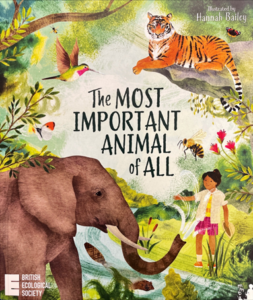
Each class had an animal to research. It was their job to convince the whole school that their animal was the most important. The children did this by looking into:
Here are the classes and their animals!
| Wrens- Elephant
Kingfishers- Tiger Sparrows- Shark Finches- Beaver
|
Owls- Bee
Starlings- Sea Otter Ravens- Krill Herons- Wolf Eagles- Bat |
The children spent 2 weeks researching their animals both in class and at home. Everyone enjoyed participating and there was a real buzz of new learning and competition in the school! When it came to presenting their findings in church, children from Early Years all the way to Year 6 spoke confidently, clearly, and enthusiastically about their animal. A great display of bravery and teamwork!
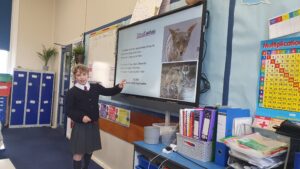
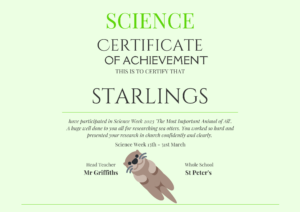
Year 3 and 4 have been investigating the part played by evaporation and condensation in the water cycle. Children in Owls are observing changes over time through monitoring the water level in two containers. Will the lid have an impact on the rate of evaporation?
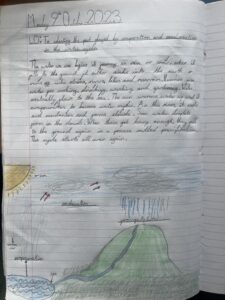
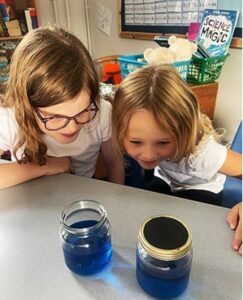
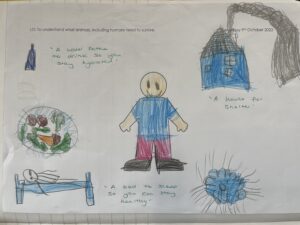
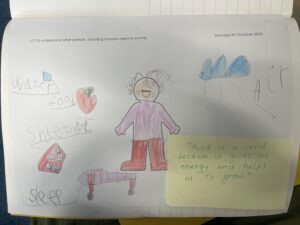
After learning about the five senses, their body parts and the life stages of a human, Kingfishers, Finches and Sparrows can identify and describe the basic needs of humans and animals. The children asked lots of questions and discussed the difference between a ‘want’ and a ‘need’.
Curriculum Enrichment & Partnerships

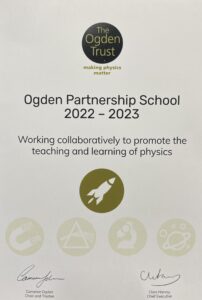
Through the YCST Science network we are pleased to work in partnership with the Ogden Trust which helps us provide a number of curriculum enrichment opportunities for our children including science competitions, workshops and playground science packs.
